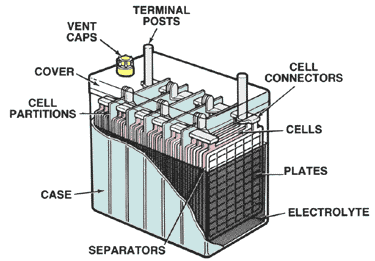The battery is needed to make the starter work and the starter turns the engine to get it running. Battery also provides the electrical source to power up the cars computers. Without the battery the car won’t start. An alternator (re-charger) keeps charging your battery while your car is running.
Warning signs indicating that the battery is dying:
There are various indications and symptoms that your battery may need replacement:
- Slow engine crank: When you attempt to start the vehicle, the cranking of the engine is sluggish and takes longer than normal to start. You’d best describe it as the “rur rur rur” starting noise sound.
- Check engine light: The check engine light sometimes appears when your battery power is weak. Strange system indicator lights–such as check engine and low coolant lights–could mean there’s a problem with your battery. (It could also just mean you need more coolant).
- Low battery fluid level: Car batteries typically have a part of the casing that’s translucent so you can always keep an eye on your battery’s fluid level. You can also inspect it by removing the red and black caps if they are not sealed (most modern car batteries now permanently seal these parts). Bottom line: If the fluid level is below the lead plates (energy conductor) inside, it’s time to have the battery and charging system tested. When fluid levels drop, it’s typically caused by overcharging (heat).
- The swelling, bloating battery case: If your battery casing looks like it ate a very large meal, this could indicate a battery gone bad. You can blame excessive heat for causing your battery case to swell, decreasing your battery life.
- Eww, there’s a stinky, rotten egg smell: You may notice a pungent, rotten egg smell (sulfur odor) around the battery. The cause: Battery leaks. Leaking also causes the corrosion around the posts (where the + and – cable connections are located.) The gunk may need to be removed or your car may not start.
- Three years + battery age is considered an old timer: Your battery can last well beyond three years but, at the very least, have its current condition inspected on a yearly basis when it reaches the three year mark. Battery life cycles range from three-to-five years depending on the battery. However, driving habits, weather and frequent short trips (under 20 minutes) can drastically shorten the actual life of your car battery.
Just ask for one during any car maintenance and we’ll give your battery the ultimate performance test with our Early Detection Analyzer. In return, you’ll receive the peace of mind knowing how much life is left in your battery or whether a replacement is recommended. We’ll also provide you with ways to improve your battery life should it be in “good” working condition.


